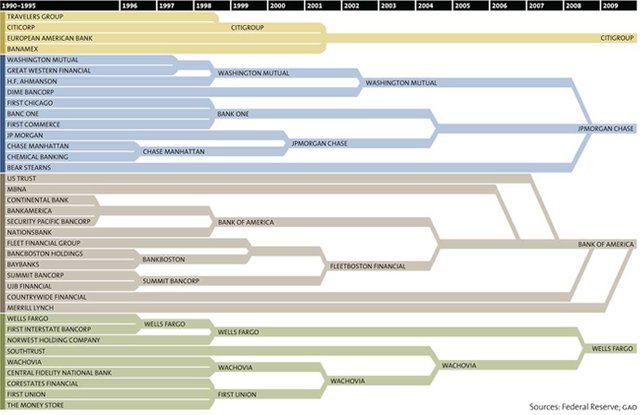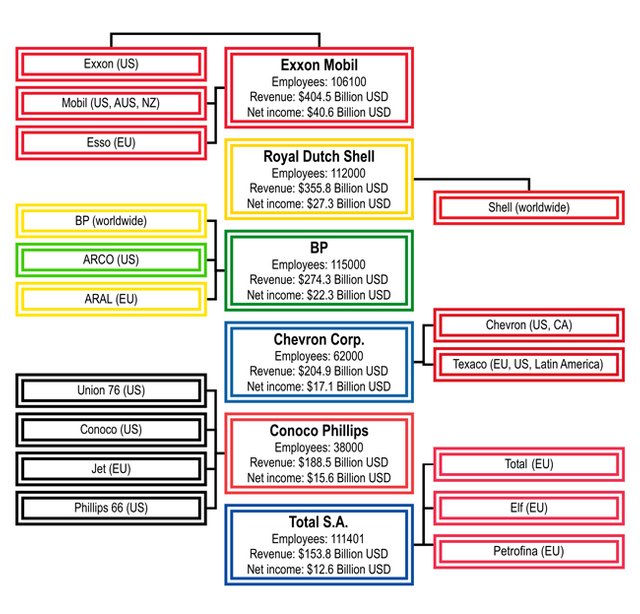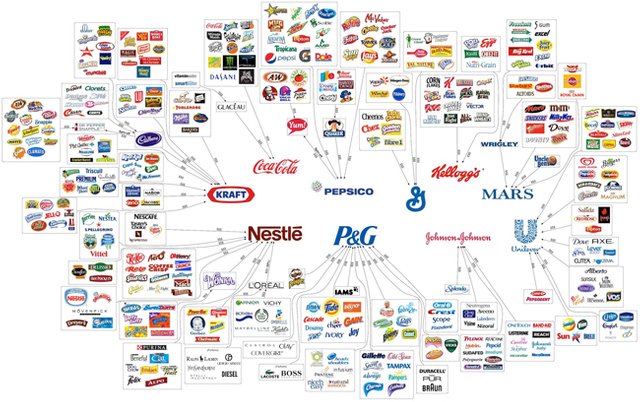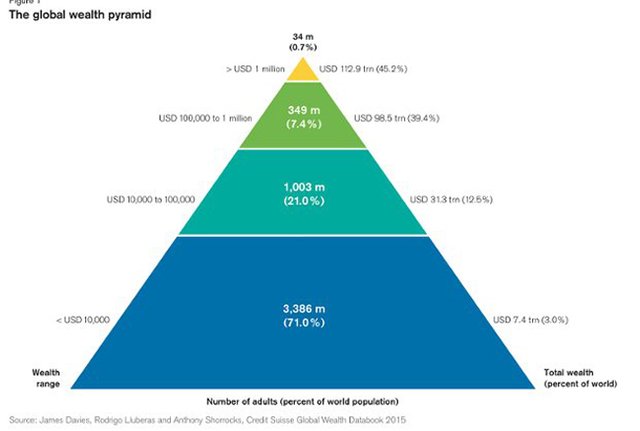Facts About Consolidation of Corporate Power - Wealth Inequality And Its Negative Impact On Society
There is a lot of disinformation going around in regard to corporate power, so I decided to provide some brief introductory information in the subject. Here are some facts in numbers and statistics.
The Big Four

[Merging of "big four" banks. Source]
The "big four" are four largest, commercial banks in United States:
- JPMorgan Chase - $2,423.8 trillion in total assets as of March 2016. (55th position in "Fortune 2016 Global 500" list)
- Bank of America - $1,685.5 trillion in total assets as of March 2016.
- Citigroup - $1,349.2 trillion in total assets as of March 2016.
- Wells Fargo - $1,101.0 trillion in total assets as of March 2016.
In the last quarter of 2014 they held about 45% ($4.6 trillion) of all commercial deposits in U.S.
(Also worth to note Goldman Sachs Group which is on the 5th place with $878.0 trillion of total assets and Morgan Stanley with $807.5 trillion of total assets. As of March 2016).
Big Oil (Aka Supermajors)

[Merging of "big oil" companies. Source]
"Big oil" consist of six multinational oil and gas corporations:
Exxon Mobil - $336.76 billion in total assets as of 2016. (6th position in "Fortune 2016 Global 500" list)
Royal Dutch Shell - $345 billion in total assets as of 2016.
Chevron Corporation - $185.39 billion in total assets as of 2016.
BP - $263.14Bbillion in total assets as of 2016.
Total S.A. - $110.94 billion in total assets as of 2016.
ConocoPhillips - $96.05 billion in total assets as of 2016.
10 Top Corporations in consumer goods (food and household/health care products only)

[Source]
Nestle - $90,033 billion revenue as of 2016. (66th position in "Fortune 2016 Global 500" list)
P&G - $76.27 billion revenue as of 2016.
Johnson & Johnson - $70,074 billion revenue as of 2016.
PepsiCo - $63,056 revenue as of 2016.
Unilever - $59,093 billion revenue as of 2016.
Coca-Cola - $44,294 billion revenue as of 2016.
Mars Inc. - $33 billion revenue as of end of 2014.
Kraft Foods - 18,205 lion revenue as of end of 2014.
General Mills - $17.90 billion revenue as of end of 2014.
Kellogg's - $14.8 billion revenue as of end of 2014.
Inequality
If you would like to know more about why inequality is bad four our society and public health, I would recommend the book "The Spirit Level: Why More Equal Societies Almost Always Do Better" by Richard G. Wilkinson and Kate Pickett. It is thorough analysis of how inequality affects our societies. It combines large amount of statistical data and factors.
There is great TED talk by Richard G. Wilkinson called "Richard Wilkinson: How economic inequality harms societies":
I also recommend watching highly awarded documentary "The Corporation". It has been uploaded on YouTube by user "TheAzureWhale".
-logic
References:
Credit Suisse - "Global Wealth Databook 2015".
The Fortune - "Fortune 2016 Global 500".
Value Walk - "How Big Oil Took Over The Oil Market"
Banks Around The World - "Largest Banks In The United States"
For some of total asset and revenue quotas I used websites:
MarketWatch and YCharts

Great visualizations. Really really good post.
Thanks dajohns1420
Great post. I'm pretty sure this does not apply to United States only.
We clearly need a revolution to change things.
Maybe Steemit is a first step forward, even is power is still concentrated is a few whale's hands.
Hopefully there will be less whales/minnows and more dolphins.
All these companies are multinational so what they do affects all humanity.
Well Steemit atm seem to follow similar capitalistic principle. So far nothing seems to promise changes but hopefully it will change.
Consolidation is a natural tendency of business. It is also an extremely worrying thing, especially since things are getting so concentrated. Great post!
Thanks. Yeah it seems intrinsic to capitalism.
The big question - and the answer to it - that could likely result in better ideas is "why is that that a problem?"
See I don't think that capitalism, or money, is the root of any evil whatsoever. But it is a great concept to build better things upon; And to this day, however bad certain aspects of society have gotten, it has helped us be better off even in those areas than we used to be decades or centuries ago.
Back when I was a socialist I would have looked at something like this and suggested that the government must be made to do something about it, but nowadays I'm not quiet as quick to suggest we change this specific aspect at all. Even at this point, as a Cooperative Agorist I obviously want to make the world a better place in all ways, but I'm also not even slightly interested in having a state take such meassures.
However, with a state government already in place, people are still more than capable of making society dramatically better without engaging in such government. -- And we are slowly getting there; we are slowly changing society, mainly via the commoditization risk. The state obviously slows it down, but with further decentralization they can't really stop it how hard they try. It won't stop with internet subscriptions, bitcoin, catbonds and steemit. There will be more developed meshnetworks, more stable cryptocurrencies, unemployment bonds, synereo/steemit 2.0. etc.
A decentralized cooperative (as a piece of, or as an anarcho-capitalist micro society) that can deliver even a universal income (if that's what's in demand) is not at all an unthinkable possibility anymore. Absolutely not. But let's not make ourselves more dependant on the governments we already have in place. Not even where I live, in Sweden - and though I consider it better than for example the US -, has that ever really been a successfull route to go.
Hey,
I don't recognise concept of evil or good. It is arbitrary and definition changes according to culture, just like beauty.
I only recognise what is sustainable and what is not. Capitalism is an obsolete system, no longer relevant to current times. It is also unsustainable.
https://steemit.com/anarchism/@logic/the-venus-project-and-resource-based-economy-transformation-towards-truly-anarchistic-social-system
It would seem you're a subjectivist, similar to Fresco.
"Evil" and "good" are as proper as -- and only of any meaning or importance if recognized as -- constructive and destructive in regard to (the quality of ones) life.
Your idea of what is "sustainable" is equally arbitrary to "good" and "bad" and though definitions may change over time, what is logical -- the existence of causality -- doesn't; as I'm sure you know. And language must adjust according to this reality in order to be of any value.
I disagree about what "Capitalism" even is, so we could only end up disagreeing about the rest. But I guess this is not the forum to ramble on about that for several hundred sentences back and forth. I'll try to write a blog post about the matter at some point in the future.
As it comes to the Venus Project, I've always found many aspects of it fascinating and very much worth supporting. I just wouldn't want to live there myself, due to the inherent risks of centralization becoming state enforced. Also, it would seem that even though ambitious as the project is (and to be honest a little crazy as it's creator, Fresco, is) noone still has even bothered to properly adress the calcualtion problem, many years later.
This seems not just slightly diheartening to me, but actually rather a big problem as it suggests a lack of constructive criticizm within the movement.
As a cooperative agorist, I'm very close to the Venus Projects, or the syndicalist, kind of thinking.But I'm not an anti-capitalist anymore and I don't defend the behaviour of extorting business owners due to their financial "agression", so to speak, which sadly many syndicalists do.
Thank you for writing though, I've actually enjoyed quiet a bit of it so far. It doesn't hurt listening to people who are of a different mind than your own, in fact anything else would be rather pointless wouldn't it ;-)
Cool comment and interesting point of view. Let me know about your blog post.
About TVP. RBE has no state as there is no such thing as authority and hierarchy there. Not sure where your opinion came from. Nothing is also enforced there. It is voluntary system. Centralisation there, refers to management of Earth's resources and production not human affairs. It is emerging system, not established like state systems. The only authority in this system are laws on nature. All systems, we have tried so far, failed (including anarchistic), because they aren't based in science and respect for natural laws. Specifically, they completely ignore the science of human behaviour.
Thanks, I'll let you know when I get to it.
My opinion about the TVP is not due to them having any expressed want to be a state, but rather due to the inherent problems I see what the kind of centralization and abandonment of money that they propose.
The way I see it, TVP indeed ignores the laws of economics. The calculation problem being the tip of the iceberg.
Apart from that I consider the idea of "property" and self-ownership to be critically important for human beings. At least for myself, as a capitalist, that would be enough to cause me to reject the project in its current state.
If a group of anarcho-capitalists could come up with something similar (provided it was otherwise equally well constructed and not just some utopic pipe dream) and base it on capitalist economics, then I would be thoroughly intrigued.
Excellent article, and very clear and good illustrations. Thank you.
Let´s try to do our part to change things, by using this platform, and beyond.
Thanks.
I hope that this platform will help in transformation too.
Awesome article! I think you structured it sooo well, defenitely deserves an upvote. I will be posting soon an article about history of US Dollar and one of the ideas I wanted to raise can't describe it better!!! Thanks
Thanks.
Let me know when it is ready then ;-)
Probably only next week.... trying to develop another idea now.... kind of pre-start :)
Food and energy are the historical culprits but I think software companies also gobbled up smaller players to grow.
It appears to be happening with all industries as soon as big player emerges.
yes, agree.
Most of what I am about to say here is mostly referring to the section about wealth, or the "so" called wealth inequality.
I recently wrote a letter to my 2 young boys and placed it here on Steemit for them to read a later stage in their life.
I am going to quote a section of that letter here because I think it applies to this post and my thoughts on it.
Many other things I write to my boys might apply here as well. If anyone is interested in the whole letter you can read it here https://steemit.com/parenting/@fat-like-buddha/a-letter-to-my-sons-preparing-for-lifes-journey
And one final point I want to make is just because "that one person over there" has something doesn't or should entitle me to have it as well, unless, of course, I want to do what that person did to achieve it.
Wealth is overrated anyway, I read an article here on Steemit recently that said anything after 200k per year has no noticeable effect on a person happiness with life anyway.
This of course, is my own personal opinions, as you can probably tell I am not a believer that a more equal or socialist society is greater than what the US currently has. I firmly believe it would only foster stagnation, boredom, and laziness.
You get an upvote still because it a well written article, even though I might not agree with its premise :)
It is true that people created concepts of fair, good evil, wrong. They are all arbitrary and shaped by culture.
The fairness I am talking about (and mentioned in book The Spirit Level) is based on what science considers sustainable for social, individual and environmental well being. Therefore this fairness is not based on subjective ideologies but refers to natural laws and human nature (human nature means basic human needs).
"stagnation, boredom, and laziness"
This claim has no base in science. Making things abundant, does not take our ability to be creative. We as human take a pleasure in sharing and cooperating. There is a reason why so many people volunteer regardless of having an employment or wealth. Also when we achieve post scarcity society with abundance, we could direct our creativity on the things we really enjoy doing (volunteerism, art, physical activities etc).
https://steemit.com/anarchism/@logic/the-venus-project-and-resource-based-economy-transformation-towards-truly-anarchistic-social-system
"200k per year has no noticeable effect on a person happiness with life anyway"
If a person grows his pocket book, but not his brain, ambitions or philosophy of life, then he is without a doubt doomed to be miserable. Money itself is an important ingredient, valueable property is a tool, but having lots of any specific currency does not make a good, happy, person.
I agree. What's in your head is important. Acquisition of something, obviously has no impact on psychological or intellectual betterment.
Rand - and this is not at all to suggest there were not issues with her or some of her ideas - used to call the attempt to become happy on the accumulation of money alone "an attempt to fake reality".
Amongst other things, she wrote the following:
"Self-esteem is reliance on one’s power to think. It cannot be replaced by one’s power to deceive. The self-confidence of a scientist and the self-confidence of a con man are not interchangeable states, and do not come from the same psychological universe."
Throughout her writing she points out over and over that happinnes comes from purposefull thought and action. From the achievement of correctly identified values.
Great work on this man!
Thank you :-)
The "iron law of oligarchy" states that all forms of organization, regardless of how democratic they may be at the start, will eventually and inevitably develop oligarchic tendencies, thus making true democracy practically and theoretically impossible, especially in large groups and complex organizations.
Why?
Why does that happen?
Because all up to date types of social organization have not been based in science and have been mostly performed by humans through competition and scientific illiteracy. If you cybernate the organisation and remove emotional component, then the true democracy can arrive. True democracy cannot operate without cooperation and high scientific literacy of population.